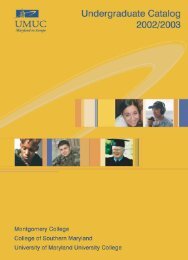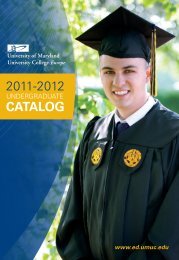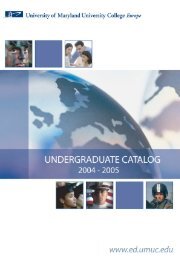UNDERGRADUATE CATALOG - UMUC Europe
UNDERGRADUATE CATALOG - UMUC Europe
UNDERGRADUATE CATALOG - UMUC Europe
Create successful ePaper yourself
Turn your PDF publications into a flip-book with our unique Google optimized e-Paper software.
RigHts And REsPonsibilitiEs oF tHE studEnt<br />
ACAdEmiC intEgRity<br />
Integrity in teaching and learning is a fundamental principle<br />
of a university. <strong>UMUC</strong> believes that all members of the<br />
university community share the responsibility for academic<br />
integrity, as expressed in the University System of Maryland<br />
“Policy on Faculty, Student, and Institutional Rights and<br />
Responsibilities for Academic Integrity.” This policy may be<br />
found in Section III, Academic Affairs, of the USM policies<br />
and procedures at<br />
www.usmd.edu/regents/bylaws/SectionIII/III100.html.<br />
At <strong>UMUC</strong>, faculty members are expected to establish<br />
classroom environments conducive to the maintenance of<br />
academic integrity by promptly giving students a complete<br />
syllabus (in <strong>UMUC</strong> <strong>Europe</strong>, faculty members make their<br />
syllabi available online by the first day of registration)<br />
describing the course and its requirements, grading submitted<br />
work promptly and adequately, and arranging appropriate<br />
testing conditions, including examinations monitored by<br />
faculty members in face-to-face (on-site) classes.<br />
Students at <strong>UMUC</strong> are expected to conduct themselves<br />
in a manner that will contribute to the maintenance of<br />
academic integrity. Failure to maintain academic integrity<br />
(e.g., academic dishonesty) may result in disciplinary action.<br />
Students are responsible for understanding and avoiding<br />
academic dishonesty and plagiarism, whether intentional or<br />
unintentional. The definitions of academic dishonesty and the<br />
procedures for pursuing complaints of academic dishonesty<br />
are described in <strong>UMUC</strong> Policy 150.25, “Academic Dishonesty<br />
and Plagiarism,” which can be found at<br />
www.umuc.edu/policy/aa15025.shtml. It is also available in<br />
Appendix H of this Catalog.<br />
APPEAling A gRAdE<br />
College and university students inevitably encounter faculty<br />
members who vary widely in teaching philosophy and<br />
demeanor and who use different teaching styles. Not only is<br />
teaching influenced by course content, there are also many<br />
ways of conveying the same material. It is only natural that<br />
students will like the style and personality of some faculty<br />
members more than others. Disagreement with a faculty<br />
member over demeanor and teaching style, however, is not<br />
grounds for a grade appeal. Students have the opportunity to<br />
express their opinions on these matters through the course<br />
evaluation forms they complete for every <strong>UMUC</strong> <strong>Europe</strong><br />
course.<br />
Regardless of teaching style, it may happen that a student<br />
believes a faculty member’s determination of a final course<br />
grade has been arbitrary and capricious. The phrase “arbitrary<br />
and capricious grading” is defined in <strong>UMUC</strong> Policy 130.80<br />
(in Appendix F) as:<br />
G A final course grade assigned on some basis other than<br />
performance in the course; or<br />
G A final course grade assigned by resorting to unreasonable<br />
standards different from those that were applied to other<br />
students in that course; or<br />
G A final course grade assigned by a substantial,<br />
unreasonable, or unannounced departure from the faculty<br />
member’s previously articulated grading standards.<br />
A student who believes his or her final grade to be the result of<br />
arbitrary and capricious grading should first confer promptly<br />
with the faculty member of the course. There is a time limit<br />
on appealing a grade; students who want to appeal a grade<br />
must initiate the process within 30 days of the posting of the<br />
grade.<br />
If the student has not been able to contact the faculty member<br />
after a reasonable effort, or if the student and faculty member<br />
cannot, after consultation, reach a satisfactory resolution,<br />
the student may file a written request with the appeal<br />
administrator (the associate dean, <strong>UMUC</strong> <strong>Europe</strong>) asking<br />
how the final grade was calculated. If the course was offered<br />
via distance education, the student may also ask the director,<br />
Distance Education for information.<br />
Procedures for appealing a grade are detailed in <strong>UMUC</strong> Policy<br />
130.80, “Procedures for Review of Alleged Arbitrary and<br />
Capricious Grading.” This can be found in Appendix F of this<br />
Catalog and at www.ed.umuc.edu/policy/aa13080.shtml.<br />
www.ed.umuc.edu 35<br />
RiGHTs And<br />
REsPonsiBiLiTiEs






